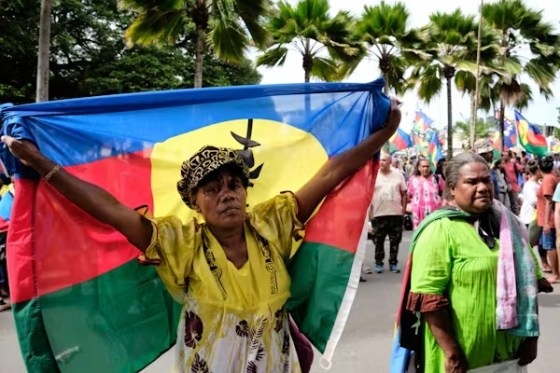Physical Address
Indirizzo: Via Mario Greco 60, Buttigliera Alta, 10090, Torino, Italy
Physical Address
Indirizzo: Via Mario Greco 60, Buttigliera Alta, 10090, Torino, Italy



A Kanak protester raising the independence flag in Noumea
New Caledonia, one of the last colonies in the Pacific, has been the scene of violent riots over the past three days following a political crisis on the island caused by the intention of parliament in Paris to adopt a draft government law providing for a constitutional amendment which extends the right to vote to French people who have lived on the island for ten years.
Peaceful demonstrations had taken place across the country in recent weeks as the National Assembly’s vote on the constitutional reform project approached before turning into riots on Monday evening taking local authorities by surprise.
Four people, including a gendarme, died in these riots, mainly in Nouméa, the island’s capital, according to a report made public this Thursday, May 16. Militias, sometimes armed, patrol certain neighborhoods to monitor homes and businesses.
At least three have died in the last forty-eight hours in looting and clashes between residents and police, supported by loyalist militias in New Caledonia. A situation described as “insurrectional” on Wednesday, by Louis Le Franc, High Commissioner of the Republic in New Caledonia.
The French government has announced the deployment of soldiers in order to “secure” the ports and airport of the overseas archipelago. A state of emergency has been declared since Wednesday evening and the use of the social network TikTok is restricted.
The new electoral project grants some 25,000 new voters the right to take part in the specific elections which directly concern New Caledonia. This reform highlights the political power that France continues to exercise over the territory.
The announced changes have sowed discord because they cancel provisions of the 1998 Nouméa Accord, in particular the restriction of voting rights. This agreement aimed to “rebalance” political inequalities so that the interests of the indigenous Kanaks and the descendants of French settlers and Algerian deportees were recognized equally. It helped consolidate peace between these groups after a long period of conflict in the 1980s, known locally as “the events”.
Kanak independence leaders believe that these amendments undermine the political status of indigenous Kanaks, who constitute a significant part of the voting population. These leaders also refuse to admit that the decolonization program has been completed, as the loyalists claim.
On the contrary, they contest the result of the final 2021 referendum which, according to them, was imposed on the territory by the French authorities too soon after the Covid pandemic. According to them, the organization of this vote did not take into account the fact that Kanak communities were very hard hit by the pandemic and were not able to fully mobilize before the vote. Requests to postpone the referendum were rejected by Paris and many Kanaks abstained as a result.
In this context, the electoral reforms decided in Paris this week are considered by the independence camps as a new political prescription imposed on the Kanak people. A leading figure in an indigenous Kanak women’s organization described the vote to me as a solution that pushes “the Kanaks into the gutter,” a solution that would make them “live on their knees.”
Many political commentators compare the violence seen in recent days to the political violence of the 1980s which took a heavy toll on the country.